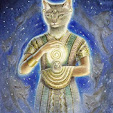A YIDDISH WINTERREISE
Mark Glanville, bass-baritone
Alexander Knapp, piano
Alexander Knapp, piano (Unfortunately, I have not been able to find an image of Alexander Knapp. Picture a tall man wearing a red yarmulke!)
"This highly acclaimed sequence of songs from the Yiddish repertoire recreates the original, Schubertian journey in a Holocaust context. The singer reflects on the life and world he has just seen destroyed as he flees the Vilna ghetto".
This was the introduction on the flyer for A YIDDISH WINTERREISE; I was intrigued when I saw this and thought, 'I MUST go to this!' I
Like the original WINTERREISE, the cycle consists of 24 songs, and includes (as number 10) a Yiddish translation of Schubert's DER LINDENBAUM. The sequence is more tragic than WINTERREISE, in that the survivor (singer/narrator) flees from the Vilna ghetto but realises that his child has burned to death....the final song is Kaddish, probably to be interpreted as a Kaddish for all the dead, all victims of war and genocide.
The songs are all taken from the rich heritage of Yiddish folk song and poetry, nearly all tragic in import, as befits the theme, but there are also some humorous songs, evoking the everyday life of the shetl.....the idea is to recreate a world that was utterly destroyed. Glanville's resonant bass-baritone is an ideal vehicle for these Yiddish songs...he is also cantor for the High Holy Days at Westminster Synagogue. He sang with deep passion and conviction, and was well-matched by Alexander Knapp's tour-de-force on the piano. Knapp has written some of the arrangements for piano, for instance for the song Vilne (Vilna), a song of longing for the town of Vilna, which was a centre of Jewish life until the destruction of its community in the Holocaust. Knapp has also written a new arrangement for Rozhinkes mit mandeln (Raisins and Almonds), a sad lullaby which is probably one of the best-known Yiddish songs outside the Jewish Community, and for Tumbalalayke (play balalaika)....'tumbalalayke' is the refrain of a gentle love song.
The seventh song in the cycle - Der rebe hot geheysen freylekh zayn (The Rabbi has told us to be merry) - is a humorous song, in which the music becomes faster and faster asthe singer imagines a horse galloping off....a challgenge for both pianist and singer , to which both rose magnificently. The sequence containst another non-tragic song, about playing a Cossack dance, but this has more of a note of defiance, as it contains a line which translates as "Even if we're poor at least we're brave".
The most tragic song of the cycle - Un a yingele vet zey firn (And a child shall lead them) is addressed ironically to the prophet Isaiah ---- "Dream your dream again, Isaiah". The poem is by H. Leivick, best known for his dramatic poem The Golem; it mocks Isaiah's prophecy that "The wolf and the sheep will live together. The child will lead them both by the hand". It is set to a traditional melody, arranged by Alexander Knapp - the musicianship of both performers is excellent in conveying the depths of despair of this heart-rending song.
As i indicated above, the cycle ends with the recital of the Kaddish, which expresses faith in G-d even after the sufferings the Jews have undergone.
The recital was very moving, with the intensity of expression of the singer, and the scintillating virtuosity of the pianist.
I understand that A Yiddish Winterreise was first performed at the Central Synagogue, Great Portland Street, London, W.1 for Holocaust Memorial Day in 2007.


















I've gone ahead and pre-ordered the CD and look forward to listening to it. Thanks for the information.
ReplyDelete